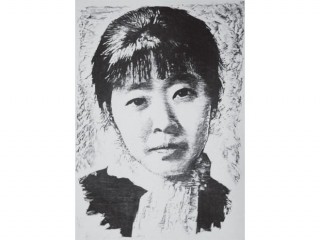
Xiao Hong (writer) biography
Date of birth : 1911-06-02
Date of death : 1942-01-22
Birthplace : Hulan District, Heilongjiang, Qing Empire
Nationality : Chinese
Category : Famous Figures
Last modified : 2011-10-06
Credited as : writer, novelist and poet,
1 votes so far
Xiao Hong was born Zhang Naiying to a landlord family in Hunan county, in the northeastern part of China (Heilongjiang). She spent an unhappy childhood under a domineering father, recalling in her memoir that her father "buried his humanity in greed." In 1926 she enrolled in a famous girls' school in Harbin. During these years she read the works of Lu Xun, Xie Bingxin, Upton Sinclair, and others, and became involved in the student movement.
When her father arranged marriage for her, she escaped to Beijing. Xiao Hong's intended husband followed her there and she agreed to live with him. They returned to Harbin where she met in 1932 Xiao Jun, a young writer. They started to publish in the local papers. In 1933 she wrote short stories 'Trek' and 'Tornado', and in the same year she and Xiao Jun were published in a joint collection of short stories, Bashe (1933). In 1934 they left Harbin, which was ruled by the Japanese occupiers, and moved to Quigdao. Finally Xiao Hong settled with Xiao Jun in Shanghai, where they became friends with Lu Xun (1881-1936), a distinguished writer of the leftist literary world. Over the next several years she was constantly moving from place to place, avoiding Japanese manoeuvres, and traveling from Wuhan to Chongquing and finally to Hong Kong.
As a writer Xiao Hong made her breakthrough with Sheng si Chang (1935, The Field of Life and Death). It appeared with the help of Lu Xun, who wrote a preface for it. The work was an instant success and made a strong impact on leftist literary circles and urban readers. It was one of the first literary works to reflect life under Japanese rule. The story depicted village life during the thirties in northeast China and the revolt against Japanese aggression.
Between the years 1935-36 Xiao Hong wrote short stories and essays, which were later collected in Shangshi Jie (Market Street: a Chinese Woman in Harbin), an autobiography covering her days in Harbin, Qiao (The Bridge), a collection of stories and essays, and Niuche Shang (On the Oxcart). In 1936 she went to Japan for health reasons and returned to China after the outbreak of the War of Resistance Against Japan in 1937. All the pieces in On the Oxcart were written in Japan. The title tale, narrated by a child, is about a domestic servant who travels to distant military garrison to discover that her husband has been executed for desertion.
Xiao Hong's short stories from the late 1930s include 'Vague Expectations', 'Flight from Danger', and 'A Cry in the Wilderness', written during her stay in Chongqing in 1938-39 and published in Kuang ye de huhan (a cry in the wilderness). While in Chongquing she published her remembrance of Lu Xun, Huiyi Lu Xun Xiansheng (1940). The author was posthumously canonized by Mao Zedong, but Mao's approval was of no concern to Xiao Hong.
In 1940 Xiao Hong moved to Hong Kong with Duanmu Honglian, a leftist writer. Although at that time she was ill, she published the first volume of a planned trilogy, Ma Bole (1940), a satire in which she mocks the patriotism of the era and trivializes the ongoing war. In Hulanhe zhuan (1942, Tales of Hulan River), Xiao Hong focuses on her hometown in Hulan and depicts, in simple yet poetic language, its people still suffering from their feudal heritage. The novel evokes domestic images and observes village stage performances, exorcist rites and festivals, but also reveals the barbarous side of life with an account of a ritual killing of a child-bride by her in-laws. - Xiao Hong died of respiratory problems in January 1942, shortly after the colony fell to the Japanese. Her works were not published until 1980, partly due to her feminism and willingness to experiment with a narrative style that was not in tune with the official doctrines of realism. On November 20, 1944 the poet Dai Wangshu (1905-1950) visited her grave, portraying the author as not responsive but still living: "A Lonely walk of six hours, / To lay red camellias by your head - / I wait through the night, / While you lie listening to the chitchat of the ocean tides."
Author of books:
Bashe, 1933 (with Xiao Jun)
Sheng si chang, 1935 - The Field of Life and Death (translated by Howard Goldblatt and Ellen Yeung)
Niucheshang, 1937 - On the Oxcart (tr. by Howard Goldblatt, inBorn of the Same Roots, 1981)
Huiyi Lu Xun Xiansheg, 1940
Ma Bole, 1940
Kuang ye de huhan, 1940
Hulanhe zhuan, 1942 - Tales of Hulan River (translated by Howard Goldblatt)
Anthology of Modern Chinese Stories and Novels, 1980 (includes Xiao Hong's short stories 'Hands' and 'Family Outsider')
Selected Stories of Xiao Hong, 1982 (translated by Howard Goldblatt)
Market Street: a Chinese Woman in Harbin, 1986 (translation of Shang shi jie by by Howard Goldblatt)
Xiao Hong san wen quan bian = Xiao Hong’s Complette Proses, 1994
















